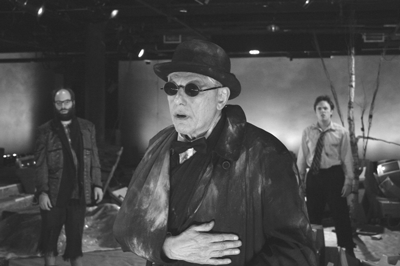They’ve blocked the exit
‘‘Godot has Left the Building” is the cutesy title of a pastiche based on Samuel Becket’s seminal play written by Joe Griffin. It’s hard to get used to the riffs from “Waiting for Godot” interspersed with the much more prosaic dialogue in the contemporary play even though none of Beckett’s dialogue is reprised.
“Waiting For Godot,” published in 1952 and first performed in 1953, was a spare piece of writing and staging—a poetic tragic-comedy about the futility of man’s existence. It had a simple tree for a prop while this new play has a huge, vaguely post-apocalyptic stage covered with detritus—mostly discarded newspapers and computer keyboards and monitors and Starbuck’s cups. Surely this is meant to evoke man’s technological soullessness but the vagrants in this production don’t interact with the props. They barely comment on just where they are.
The terrible set design, credited to Garin Marshall, who also did the lights, looks like it was kicked or thrown into place, and at one point debris comes crashing down the steps blocking the exit. There are also showers of cups from time to time. Considering the space the actors have to roam around in it’s fairly well directed by Will Pomeranz.
He keeps the actors moving and he makes good use of all the room he has on stage.
Here we have Edward Griffin—brother of the playwright—as Joe (Estragon), who performs amicably, stumbling onto these basement ruins. He’s got a doe eyed innocence that serves him well in a play where he is mostly on the defensive.
Has something blown up? We don’t know what he’s doing there. He isn’t wearing any shoes for which there is no explanation except to set up the business of the boot that Vladimir and Estragon performed in the original; but he has a briefcase with him and a cell phone that he smashes to bits when it won’t work. Hiding in the clutter is Sebastian (Vladimir), Scott David Nogi who also performs admirably.
The actors have plenty of energy to spare, which almost makes the play watchable. Unfortunately their speeches go on for too long and we don’t know what the two men want from each other.
Briefly we suspect that they are the last two men on earth but it turns out there are a couple of walk-ons—a blind Old Man (Bert Gurin), also cribbed from the original, and an Actor looking for his agent (Gabriel Gutierrez). Unlike Beckett, this character seems to imply that things are possible. On the other hand he could just be a shallow blowhard.
The two principals play numbskull games and Sebastian declares himself the winner though we never really know what his games are about. The two men taunt each other as in the original play and make plans to write a movie script and fulfill their dreams.
The play is full of non-sequiturs—the men keep changing one boot and even switch underwear. But it would be a mistake to claim the play is a copy of Beckett’s. It has its own crazy dialogue, much of which is meant to be funny but isn’t. Beckett had a dry sense of humor and an unyielding wit while this play is all talk and very little of it is felicitous.
Sebastian is the stronger character and he keeps Joe on the defensive. But the play doesn’t have Beckett’s sado-masochistic overtones; the men have a congenial relationship. If we’re more interested in Joe it’s because he appears—in suit, tie, and briefcase—to have more panache. They are expecting their own Godot, who mercifully is never mentioned, though it’s clear they are waiting for something. They have dreams which Vladimir and Estragon never had. The first and second acts end with both men falling asleep hoping for a better day tomorrow—the bliss of forgetfulness, a blessing Beckett didn’t give his characters.
Why write this play? Beckett covered the ground thoroughly and was funny besides. Mike Nichols directed Steve Martin and Robin Williams in an unforgettable if slightly unfaithful 1988 Lincoln Center production for which the author submitted new text. This play is sui generis; everything that happens on stage in “Godot Has Left the Building” recalls the original—even though the writer has tried hard to make the material his own.
I guess you could call this production found art, using found material to create new art. But Beckett is a tall order and the original has many difficulties of its own. I’d rather see a revival.
gaycitynews.com


































